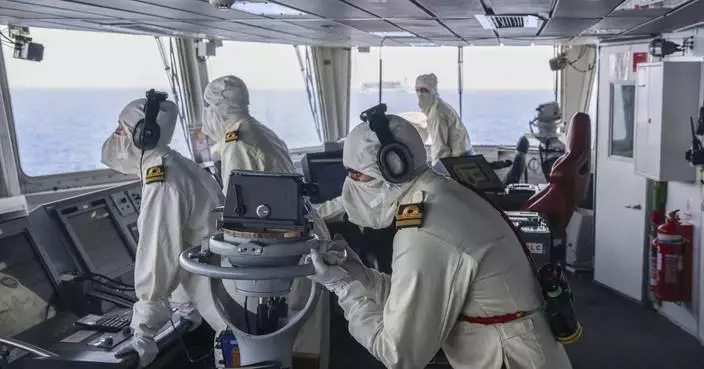Yemen's foreign minister said his government will work with President Joe Biden's administration to end the war in the Arab world's poorest country.
Still, Ahmed Awad Bin Mubarak insisted the Houthi rebels and their Iranian backers remain the main obstacle to peace — an apparent defense of Saudi military involvement in Yemen.
On Thursday, Biden announced the U.S. was ending support for the grinding Saudi-led war in Yemen. The five-year conflict has killed some 130,000 people, including over 13,000 civilians, and resulted in the world’s worst humanitarian crisis.
“We will deal positively with the attitude of the new U.S. administration, which wants to end the conflict in Yemen,” Bin Mubarak told The Associated Press late Thursday.
“This has always been our goal since the war started, and we dealt positively with all U.N. initiatives in the past, but we are always faced with the intransigence of Houthi militias and Iran’s agenda in the region," he said.
Houthi spokesman Mohamed Abdel Salam tweeted late Thursday that peace would not be achieved until “the aggression was brought to a halt and the siege was lifted.”
Yemen’s war began in September 2014, when the Houthis seized Sanaa and began a march south to seize the entire country. Saudi Arabia, along with the United Arab Emirates and other countries, entered the war alongside Yemen’s internationally recognized government in March 2015.
Biden announced an end to “relevant” U.S. arms sales but gave no immediate details on what that would mean. The administration already has said it was pausing some of the billions of dollars in arms deals with Saudi Arabia and the United Arab Emirates, Saudi Arabia’s main partner in its Yemeni offensive. The U.S. has sold bombs and fighter jets to Saudi Arabia that the kingdom later used in strikes on Yemen killing civilians.
Biden also called for a cease-fire, an opening of humanitarian channels to allow more delivery of aid, and a return to long-stalled peace talks.
Saudi Arabia has been conciliatory in its response to rebuffs from Biden, who as a candidate blasted the kingdom’s current rulers for rights abuses and as president has made clear he intends to distance his administration from Saudi leaders.
However, the Biden administration also says it will help Saudi Arabia boost its defenses against outside attacks, as part of maintaining key security, counterterrorism and military ties. Saudi state media focused on that part of Biden’s announcements Thursday.
The Yemeni government also welcomed Biden's decision to appoint Timothy Lenderking as special envoy to Yemen, hailing it as another “important step” attesting to the U.S. commitment to end the war, according to a statement from Yemen’s state-run SABA news agency.
JERUSALEM (AP) — The head of the United Nations' nuclear watchdog will travel to Iran next week as Tehran's nuclear program enriches uranium a step away from weapons-grade levels and international oversight remains limited, officials said Wednesday.
Rafael Mariano Grossi's visit will coincide with a nuclear energy conference Iran will hold in the central city of Isfahan, which hosts sensitive enrichment sites and was targeted in an apparent Israeli attack on April 19. It also coincides with wider regional tensions in the Mideast inflamed by the Israel-Hamas war in the Gaza Strip, including attacks on shipping by Iranian-backed Houthi rebels in Yemen.
The director-general of the International Atomic Energy Agency will visit Iran on May 6 and 7, the Vienna-based agency said. It did not elaborate on his schedule or his meetings.
Iranian state television has described the conference in Isfahan as an “international conference on nuclear sciences and techniques.” The broadcaster quoted Mohammed Eslami, the head of Iran's civilian nuclear program, as saying on Wednesday that Grossi will attend the conference and meet with him and other officials.
“I am sure that the ambiguities will be resolved and we can strengthen our relations with the agency within the framework of safeguards and” the Nuclear Non-Proliferation Treaty, Eslami said.
Tensions have only grown between Iran and the IAEA since then-President Donald Trump in 2018 unilaterally withdraw America from Tehran's nuclear deal with world powers. Since then, Iran has abandoned all limits the deal put on its program and now has enough enriched uranium for “several” nuclear bombs if it chose to build them, Grossi has warned.
IAEA surveillance cameras have been disrupted, while Iran has barred some of the agency's most experienced inspectors. Iranian officials have increasingly threatened they could pursue atomic weapons, particularly after launching an unprecedented drone-and-missile attack on Israel last month.
Iran has always denied seeking nuclear weapons, saying its atomic program is for purely civilian purposes. However, U.S. intelligence agencies and the IAEA say Iran had an organized military nuclear program up until 2003.
The latest American intelligence community assessment says Iran “is not currently undertaking the key nuclear weapons-development activities necessary to produce a testable nuclear device.”
Associated Press writer Amir Vahdat in Tehran, Iran, contributed to this report.

FILE - International Atomic Energy Agency Director General Rafael Mariano Grossi waits to meet Japan's Prime Minister Fumio Kishida shakes hands at the prime minister's office in Tokyo Thursday, March 14, 2024. The head of the United Nations' nuclear watchdog will travel to Iran next week as Tehran's nuclear program enriches uranium a step away from weapons-grade levels and international oversight of the program remains limited, officials said Wednesday, May 1, 2024. (AP Photo/Eugene Hoshiko, Pool, File)










